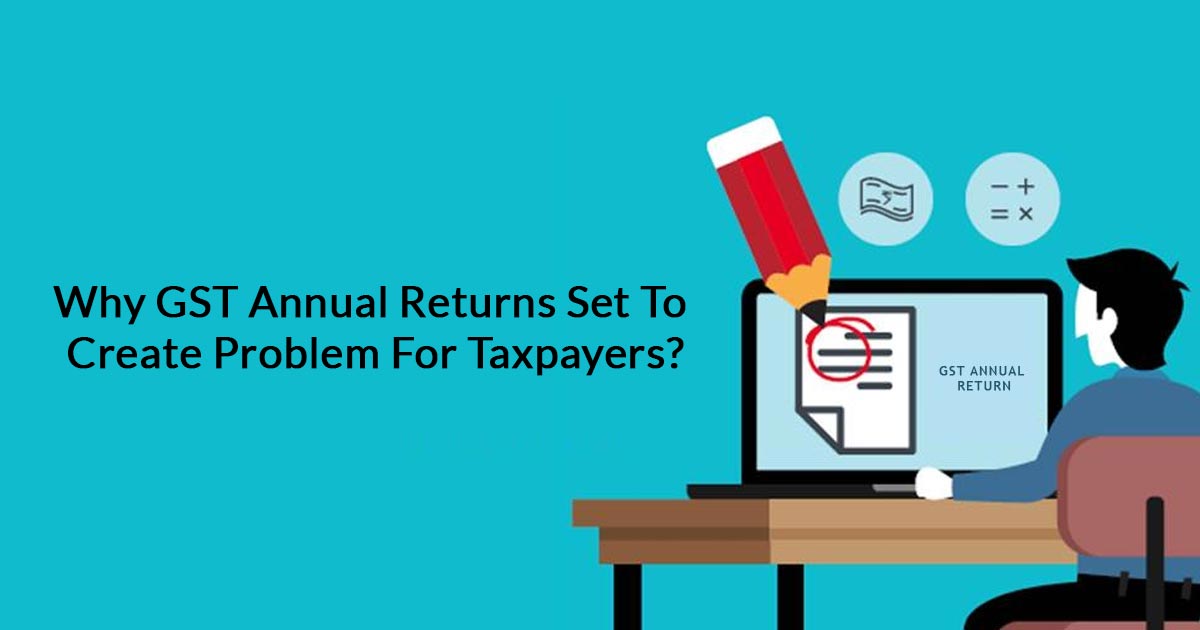The Trade and Industry community are expected to face problems in terms of Annual Filings under the goods and services tax (GST) regime in the upcoming months.
Two forms are required to be notified for annual filing and they are:
- an annual return to be filed by a taxpayer and
- a GST reconciliation statement that has been certified by a practising chartered accountant.
Considering the complex structure of annual form filing, we believe that it is an appropriate time to discuss critical issues that require immediate attention from various stakeholders, including corporates, professionals and the government.
Disadvantages for the Small Taxpayers
- Every registered person is ought to file an annual return in Form GSTR-9 irrespective of the turnover limit and a GSTR 9C Form, which is a reconciliation statement and needs to be filed by only those taxpayers whose aggregate turnover exceeds Rs 2 crore in a financial year.
- The Annual return is a basic form which is based on arithmetic calculations of all the details provided in GSTR-3B and GSTR-1 during the relevant period. But the constraint is that there is no column for amendment of such details.
This is a problem situation for the small taxpayers which meant that there is no such mechanism through which mistakes committed during the 2017-18 financial year could be corrected even if the taxpayer intended to correct it by the payment of additional tax or through reversal of ineligible tax credits. It is also obvious that how could a system or mechanism could be considered perfect if it does not have a corrective system or a backup!
Annual Return Enforces Tax Positions on Taxpayers
Following a particular provision of GST law, the Annual return puts a break on claims of input tax credit pertaining to 2017-18 financial year post 30 September 2018. While Tax experts have different views on this aspect. The Gujarat High Court has also considered a formal writ petition in terms of merits against such tax provision in GST law.
If we talk in Legal terms then, GST is a trust-based self-assessment tax, through which taxpayers are permitted to pay tax according to their understanding of tax laws and tax positions taken by them.
The earlier followed tax positions have been now denied by the Department and a watertight provision has been notified and is required to be followed. Thus, it is quite evident from the current scenario that a subordinate piece of legislation has overtaken a superior piece of legislation (CGST Act). Therefore, The ban in forms must be removed.
The Mismatch in Monthly GSTR-3B and GSTR-1
The mismatch between the monthly reporting of outward supplies in GSTR-3B and GSTR-1 has taken place due to the problems which have arisen just after the GST implementation in the Country. Due to the starting problems which came into existence and the numerous clarifications and notifications as well as frequently changing tax rules, a considerable mismatch between monthly reporting of outward supplies in GSTR-3B and GSTR-1 could be seen. Now, the concern is that whether GSTR 1 or GSTR 3B should be taken as a basis for preparation of the annual return or not.
It seems as if the Tax Returns and filing is not yet clear to the Authorities themselves. This could be said on the basis that the instructions issued by the department on Annual filing are expected to be of no help as it states, Table ___ from GSTR ___ may be used for filling up these details”. This statement in itself sounds very irresponsible. As tax return and filing is a matter of utmost importance.
An Additional Burden on Taxpayers is Reporting
Now we would discuss the tables that need information that is currently not required to be filed in any tax return. Thus, any such information has not been captured by many taxpayers at the time of processing transactions. We would discuss two of them:
For all the inward supplies, a taxable person is required to fill the table in annual return summary, Harmonised System of Nomenclature (HSN) wise.
Now the dilemma situation arises here that such reporting is mandatory irrespective of the fact that supplier has not mentioned any HSN on the invoice, thus, forcing a reporting taxpayer to find out HSN for all such products and take the credit of finding a correct one for every supply.
The aggregate value of supplies received from composition taxpayers is made mandatory for reporting in annual return. While, the GST law never passed obligation to a taxpayer to accumulate and assimilate such information, thereby putting this additional burden on taxpayers to manually check millions and millions of transactions, thus making the whole process a cost-ineffective activity. Therefore, Such requirements should be abolished.
Another Big issue: Taxpayers Under Cancellation!
There are such taxpayers who have filed for cancellation of GST Identification Number on or before March 31, 2018, and there are some who have even filed after such date. All these taxpayers are required to file annual return forms as mandatory. But, the matter of concern is whether GSTN would permit such taxpayers to log in to the system for the purposes of filing tax returns in spite they have surrendered their tax ids or not.
Required the Reconciliation Statement with Annual Accounts
A reconciliation statement is required to be attached with audited annual accounts as it portrays a comparison between annual returns and such audited annual accounts.
Now another concern in the case is for multi-state taxpayers, that whether PAN level financial statement needs to be attached with Form 9C or a separate branch level statement needs to be prepared.
So we see that these are only a few of the areas that need to be taken care of by authorities before a final version is implemented. We expect that sooner or later issues would be settled in favour of taxpayers thus, easing the forms and removing the complexities and hence ensuring quick and seamless compliance of the law.










